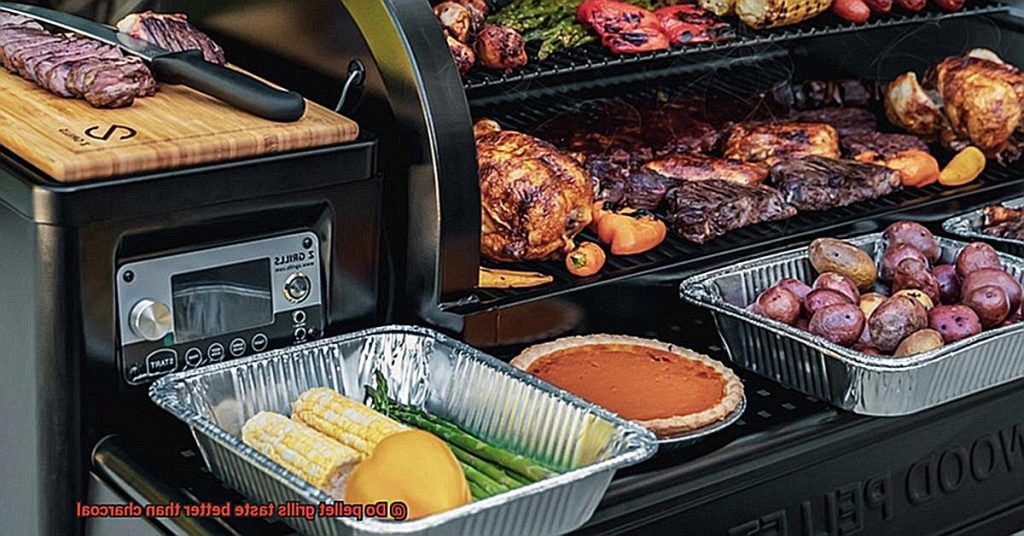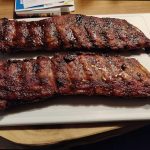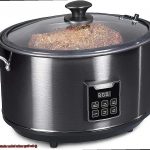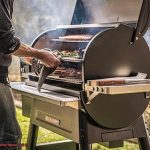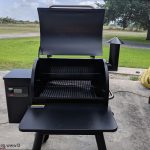The sun is shining, the birds are singing, and the smell of barbecue is in the air. It’s time to get your grill on. But with so many options out there, how do you know which one will give you that mouth-watering flavor you crave? That’s where we come in. Today’s hot topic: pellet grills vs. charcoal grills – which one reigns supreme in the taste department?
Charcoal grills have been around for ages and are a tried-and-true favorite among grill masters everywhere. The smoky flavor they impart on your meats and veggies is unbeatable. However, pellet grills have been making waves in recent years with their high-tech features and ease of use. These electrically powered grills use compressed wood pellets to create heat and smoke, resulting in a deliciously charred finish.
So what’s the verdict? Which type of grill will give you that perfect blend of flavor and convenience? In this post, we’ll break down the pros and cons of each grill style and put them head-to-head in a taste test for the ages. So grab a cold drink, fire up your laptop, and let’s settle this once and for all – pellet or charcoal?
Contents
What are Pellet Grills and Charcoal Grills?
Grilling is an art form enjoyed by many, and selecting the right grill can greatly improve your outdoor cooking experience. Two of the most popular types of grills are pellet grills and charcoal grills. So, what are they, and how do they differ?
Pellet grills use wood pellets as fuel, which are fed into a hopper and ignited by an electric auger. A digital thermostat allows for precise temperature control and consistent cooking results. Pellet grills are highly convenient and easy to use, with features like smartphone apps and Wi-Fi connectivity, making them a breeze to operate remotely.
Charcoal grills, on the other hand, use charcoal briquettes or lump charcoal as fuel, requiring manual ignition and temperature control. Charcoal grills are known for their ability to reach high temperatures quickly, making them perfect for searing meats. They also impart a smoky flavor that many people find irresistible.
But what about the taste? The debate between pellet grills and charcoal grills can be quite contentious. Some argue that pellet grills produce a more subtle smoky flavor because wood pellets burn cleaner than charcoal, resulting in less smoke. However, others assert that charcoal grills produce a bolder, more authentic smoky flavor that cannot be matched by a pellet grill.
Temperature control is another factor to consider. Pellet grills have digital controllers that allow for precise temperature control and even cooking results. In contrast, charcoal grills require more skill and attention as the cook must manage airflow and add or remove charcoal to maintain consistent temperatures. The ability to maintain a consistent temperature can also affect the food’s flavor.
Ultimately, choosing between a pellet grill and a charcoal grill comes down to personal preference. Pellet grills offer convenience and precise temperature control, while traditionalists swear by the bold smoky flavor produced by charcoal grills. With either type of grill, experiment with high-quality ingredients and different techniques to achieve the perfect flavor and texture for your outdoor cooking creations. Happy grilling.
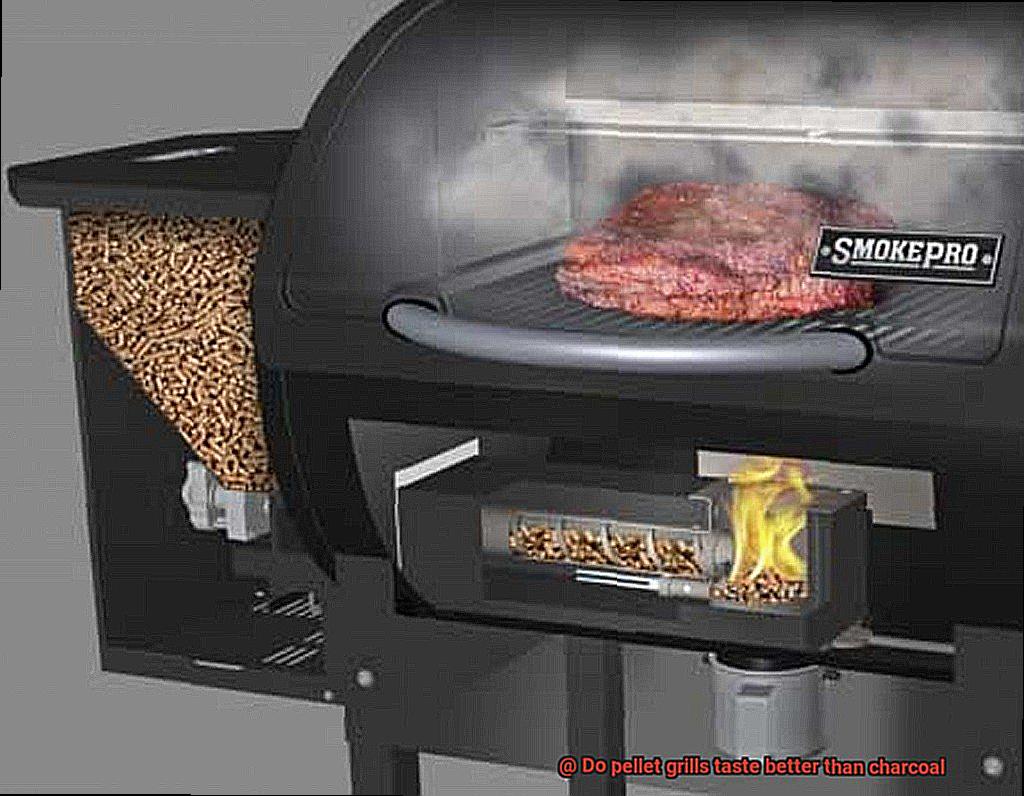
Fuel Source Impact on Flavor
Let’s delve into the details and explore how these two fuel sources impact the flavor of food cooked on a grill.
Charcoal grills are famous for their smoky flavor, which is achieved by burning charcoal briquettes or lump charcoal. The smoky flavor can be intensified by adding wood chips to the grill, providing additional layers of flavor. However, not all woods are created equal when it comes to flavor. Hickory wood provides a strong smoky taste, while applewood offers a sweet and fruity flavor. Therefore, the type of wood used in your charcoal grill can make or break your dish’s overall flavor.
On the other hand, pellet grills use compressed sawdust and other wood waste materials as their fuel source. These pellets come in various flavors such as hickory, mesquite, and applewood, allowing for more options in terms of flavor profiles. Pellet grills also offer more control over temperature than charcoal grills, resulting in a more consistent cooking and flavor experience.
But which one tastes better? The answer is subjective and depends on personal preference. If you enjoy the traditional smoky flavor of charcoal, then a charcoal grill is the way to go. But if you are looking for convenience and versatility with a range of flavors, then a pellet grill might be your best bet.
In conclusion, whether you choose a pellet grill or a charcoal grill, both can produce mouth-watering results when used correctly. Experimenting with different types of wood and pellets can help you find your ideal flavor profile. To sum up, below are some key takeaways about how fuel source impacts flavor:
Temperature Control Comparison
When it comes to grilling, there’s nothing quite like the taste of perfectly cooked meat. And while charcoal enthusiasts may argue that their grill produces the best results, it’s hard to deny the advantages of pellet grills when it comes to temperature control.
Pellet grills are equipped with digital controllers that allow for precise temperature control. This means that you can set your grill to the exact temperature you need and walk away, confident that your food will cook evenly and consistently. Pellet grills can maintain temperatures within a few degrees of the desired setting, making it easier to cook food to perfection.
On the other hand, charcoal grills rely on airflow to control temperature which can make it difficult for beginners. Experienced grillers may know how to adjust vents and use other techniques to maintain a consistent temperature, but for those new to grilling, it can be a challenge. Additionally, factors such as wind, humidity, and charcoal type can affect the temperature inside a charcoal grill which means that maintaining consistent results requires constant monitoring and adjustment.
Pellet grills also have an advantage when it comes to maintaining low temperatures for long periods of time. Pellet grills can be set as low as 150°F which makes them perfect for smoking meats or cooking delicate foods such as fish or vegetables. Charcoal grills, on the other hand, can be more difficult to control at low temperatures and may require additional equipment such as a water pan or heat deflector.
In summary, here are some key takeaways on temperature control comparison between pellet and charcoal grills:
- Pellet grills offer greater precision and control over temperature due to their digital controllers.
- Maintaining a consistent temperature on a charcoal grill requires experience and constant monitoring.
- Pellet grills are better at maintaining low temperatures for long periods of time.
- Charcoal grills may require additional equipment to achieve the same results as pellet grills.
Personal Preference and Cooking Style
When it comes to grilling, personal preference and cooking style are the driving forces behind whether a pellet grill or charcoal grill is better. It’s important to note that both options have their unique advantages and disadvantages, and what works for one person may not work for another.
Let’s start with personal preference. Are you a fan of the smoky flavor that comes from a charcoal grill? Or do you value the convenience and consistent heat of a pellet grill? Your taste buds and grilling experience are key factors to consider when choosing between the two.
For those who love the classic smoky taste, charcoal grills are the way to go. They produce high heat and give food that signature smoky flavor that many people crave. But if you’re someone who wants more control over the cooking process, pellet grills may be a better fit. With easy temperature control and a variety of flavors to infuse into your food, you can achieve consistent, delicious results every time.
Another consideration is your cooking style. If you’re someone who likes to experiment with different foods and flavors, a pellet grill is ideal. It offers precise temperature control and digital controllers that keep everything on track – perfect for delicate fish or more hearty meats. But if you prefer sticking to classic recipes, charcoal grills offer that nostalgic outdoor cooking experience that many people love.
It’s also important to consider the type of food you’ll be grilling. While charcoal grills are great for meat and hearty vegetables, pellet grills excel at cooking delicate fish or vegetables. They provide more precise temperature control and less risk of overcooking.
Pros and Cons of Pellet Grills vs Charcoal Grills
Grilling is more than just cooking food; it’s a passion that brings people together. Whether you’re a seasoned grill master or a novice, choosing the right type of grill can make all the difference in your cooking game. Pellet grills and charcoal grills are two popular options on the market, each with their own pros and cons. As an expert in this field, I’m here to help you weigh your options and make an informed decision.
Let’s start with pellet grills. One of the most significant advantages of using a pellet grill is how easy it is to use. With an electronic control panel, you can easily set the temperature and cooking time, allowing you to manage your cooking without having to monitor it constantly. These grills are also incredibly versatile and can be used for smoking, roasting, and baking, making them perfect for any grilling enthusiast. Plus, they offer a wide range of flavors to infuse into your food, making every meal unique.
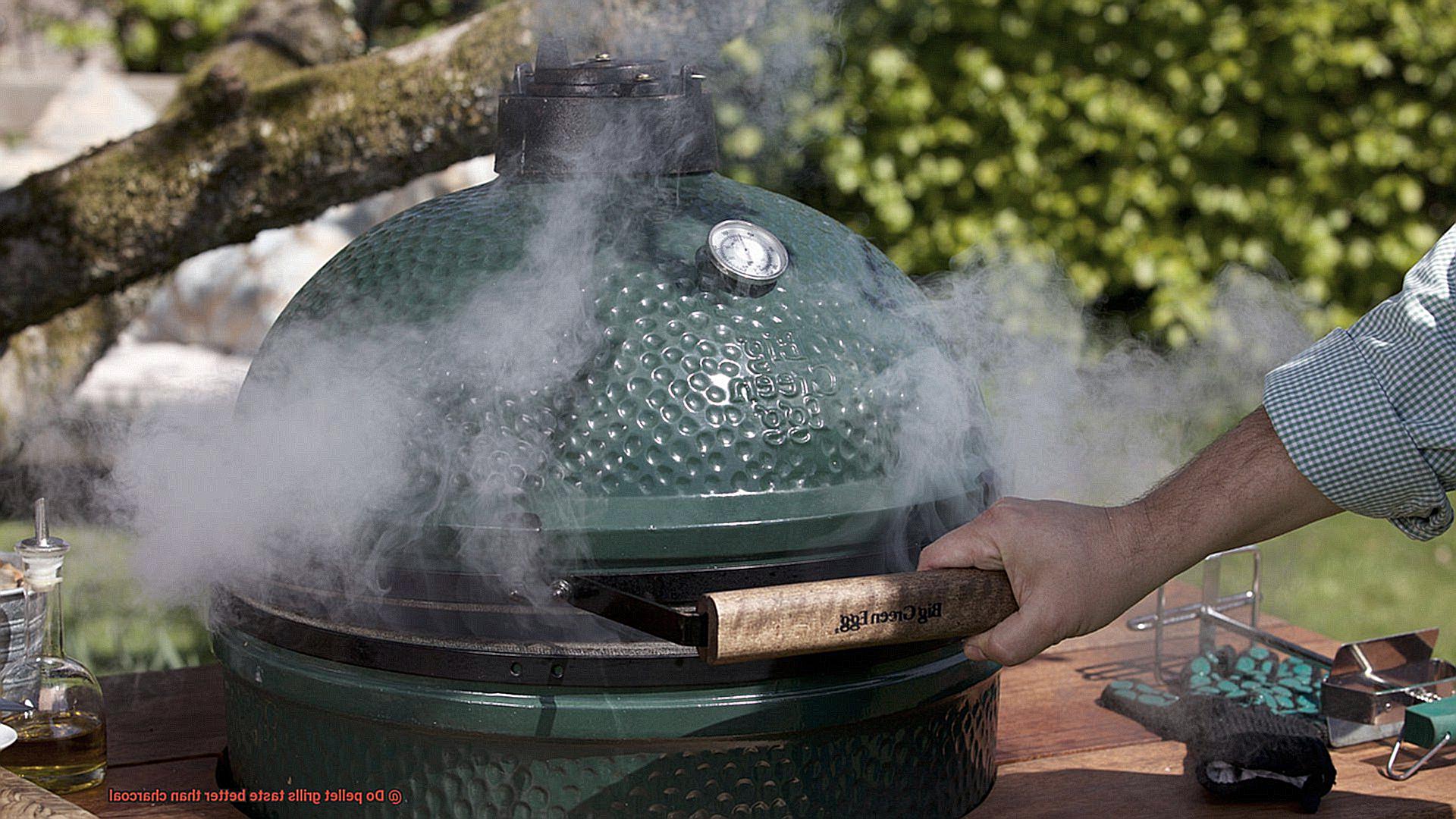
However, one of the main drawbacks of using a pellet grill is their price tag. They can be quite expensive compared to other types of grills. Additionally, if you’re planning on using your grill in a remote location or during a power outage, a pellet grill may not be the best option for you since they require electricity to operate.
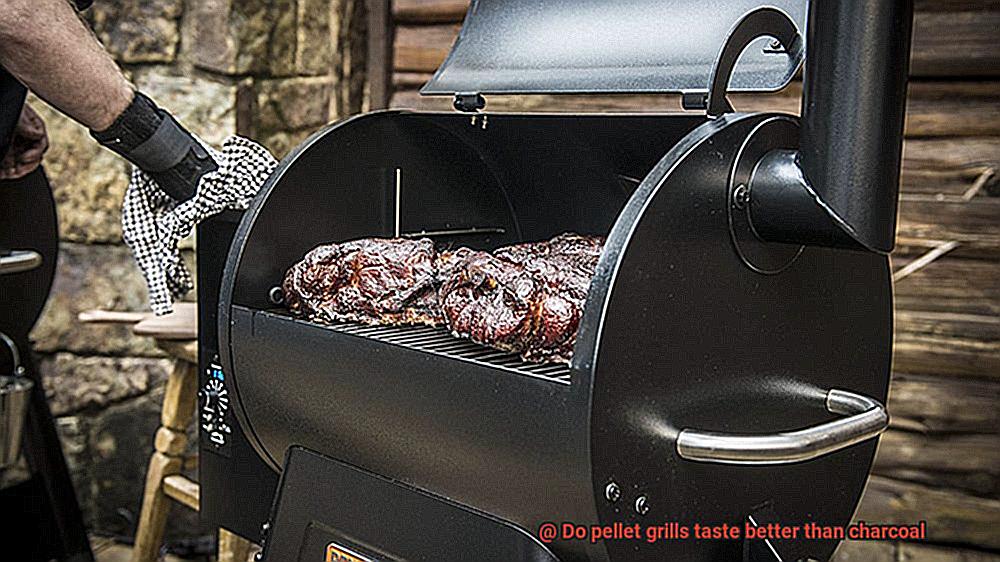
Now let’s turn our attention to charcoal grills. One of the biggest advantages of using a charcoal grill is the smoky flavor it provides. Charcoal grills are relatively inexpensive compared to pellet grills and don’t require electricity to operate. Plus, they’re ideal for outdoor cooking and can be used in various settings.
However, one of the main disadvantages of using a charcoal grill is that it can be challenging to control the temperature throughout the cooking process. Unlike pellet grills that have an electronic control panel, charcoal grills rely on the user’s ability to manage airflow and maintain a consistent temperature, which can be tricky for beginners. But with practice, you can master the art of charcoal grilling and achieve that perfect smoky flavor.
The Best Grill for Different Types of Food
Grilling is a beloved pastime that can yield mouthwatering results, but selecting the right grill can make a world of difference in the taste and texture of your dishes. While both pellet grills and charcoal grills have their merits, certain types of food may benefit more from one over the other.
For meats like beef, pork, and lamb, a charcoal grill is an excellent choice. The intense heat produced by burning charcoal can create a beautiful sear on the exterior of your meat while imparting a smoky flavor that perfectly complements these hearty proteins. Additionally, charcoal grills offer precise temperature control, which is essential when cooking thick cuts of meat that require low and slow heat.
On the other hand, if you’re planning to grill seafood or vegetables, a pellet grill may be a better fit. Pellet grills utilize wood pellets as fuel, resulting in a subtle smoky flavor that won’t overpower the natural taste of your ingredients. These grills also have more versatile cooking options such as smoking or roasting, which can be ideal for cooking delicate seafood or tender vegetables.
Safety Considerations When Using a Pellet or Charcoal Grill
It is important to remember that safety should always come first when using either a pellet or charcoal grill. These popular cooking methods can pose potential hazards if not used properly.
To start, keeping your grill at a safe distance from any flammable objects is crucial. Never place your grill too close to buildings, trees, or anything else that could catch fire. Also, never leave your grill unattended while in use. This is especially important with pellet grills since they require electricity to operate and could potentially cause a fire if left unattended.
Another critical safety consideration when using a charcoal grill is proper ventilation. Carbon monoxide is emitted by these types of grills and can be deadly if inhaled in large quantities. Always use your charcoal grill in a well-ventilated area and never indoors. This means avoiding enclosed spaces like garages or covered patios.
When it comes to pellet grills, maintaining proper cleaning and maintenance is essential for safety. Pellets used in these grills can create a buildup of ash and creosote, which can become a fire hazard if not cleaned regularly. Follow the manufacturer’s instructions for cleaning and maintenance to ensure your pellet grill stays safe and functional.
In summary, whether you prefer the intense heat and smoky flavor of a charcoal grill or the subtle smokiness of a pellet grill, safety should always be your top priority. Here are some key considerations:
- Keep your grill at a safe distance from any flammable objects
- Never leave your grill unattended while in use
- Ensure proper ventilation when using a charcoal grill
- Maintain your pellet grill with regular cleaning
Maintenance Tips for Pellet and Charcoal Grills
Pellet and charcoal grills are the perfect way to cook delicious meals for your friends and family. However, it’s important to keep your grill in great shape to ensure that it functions properly and lasts for years. Here are five reasons why regular maintenance is so important for these types of grills:
Prevents Build-up of Ash, Grease, and Debris
One of the main reasons why regular cleaning is essential for pellet and charcoal grills is to prevent the build-up of ash, grease, and other debris that can affect the flavor of your food. Regular cleaning of the grill grates after each use ensures that any food remnants won’t affect future meals. Additionally, cleaning the hopper on a pellet grill prevents clogs and ensures that the pellets flow smoothly.
Ensures Optimal Performance
Regular maintenance ensures that your grill is performing at its best. For pellet grills, this means making sure that the hopper is cleaned and free from obstructions, while charcoal grills require regular emptying of their ash collection trays. When your grill is functioning optimally, you can be sure that it will produce great-tasting food every time.
Prevents Rust
Grills are made from metal, which makes them prone to rust if they’re not properly maintained. By regularly cleaning and drying your grill after each use, you’ll prevent moisture from building up and causing rust. This helps preserve the life of your grill and ensures that it looks great for years to come.
Extends Grill Lifespan
By regularly maintaining your grill, you’ll extend its lifespan and save yourself money in the long run. A well-maintained grill will function better, last longer, and produce better-tasting food. With a little bit of effort, you can ensure that your investment in a grill pays off for years to come.
Preserves Food Flavor
Ultimately, regular maintenance ensures that your food tastes as good as possible. By preventing any build-up or debris from affecting the flavor, you’ll be able to enjoy delicious meals cooked on your grill every time you use it.
6zSZXDj5U-A” >
Conclusion
In the great debate of pellet grills versus charcoal grills, there are strong arguments on both sides. On one hand, charcoal grills have been around for centuries and are renowned for their smoky flavor. On the other hand, pellet grills offer convenience and precision temperature control.
But when it comes to taste, both types of grills can create mouth-watering results that will leave your guests begging for seconds. Charcoal grills deliver a bold smoky flavor that many people crave, while pellet grills offer greater versatility in terms of flavors and temperature control.
Temperature is another key consideration when choosing between pellet and charcoal grills. Pellet grills feature digital controllers that allow for precise temperature regulation, while charcoal requires more skill to maintain consistent temperatures.
No matter which grill you choose, safety should always be your top priority. Proper ventilation and regular cleaning are essential for both pellet and charcoal grills to prevent potential hazards.
Lastly, don’t forget about maintenance. Regular upkeep is critical to ensuring optimal performance, preventing rust buildup, extending your grill’s lifespan, and preserving food flavor. Armed with these tips, you’ll be well on your way to becoming a grill master – no matter which type of grill you prefer.

